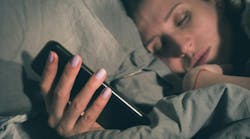A quick survey of around 600 people staying at home during the COVID-19 health crisis has reaffirmed what many of us already know but often ignore: Exposure to natural light and, generally speaking, to bright artificial lighting during indoor waking hours can boost a number of health factors including sleep quality and mental wellbeing.
The Lighting Research Center (LRC) at Rensselaer Polytechnic Institute sent the survey in May. It heard back from around 600 homebound recipients who were either working from home or unemployed and staying at home.
The LRC, based in Troy, NY, asked a series of questions aimed at sizing up the effect of daily indoor and outdoor light exposure.
“Compared to people with ‘somewhat dim’ to ‘very dim’ indoor lighting, people with ‘somewhat bright’ to ‘very bright’ lighting, including having windows without (or with open) curtains or shades, or having several lights turned on, reported: fewer sleep disturbances; less anxiety and depression; feeling less tired or less irritable; feeling generally happier and more positive; less sleep-related impairment,” LRC said in summarizing the results. (See the charts below.)
“Sleep quality and mood significantly improved when people spent the majority of their time in a brighter, compared to dimmer, location in their homes,” said LRC researcher Charles Jarboe, who led the study. “If you can add a little more light to your space during the day — one extra lamp, or open your window shades, for example, it could help you feel better, and improve your sleep.”
That’s not to discount time outdoors under the real deal of natural light, where 1‒2 hours can make a big difference in anxiety, stress, and depression — although the benefits leveled off after two hours, the survey showed, and morning light showed the greatest benefit.
“Our results show that just one hour spent outdoors each day can help you feel your best, and can help you sleep better at night,” said LRC director Dr. Mariana Figueiro.
MARK HALPER is a contributing editor for LEDs Magazine, and an energy, technology, and business journalist ([email protected]).
LEDs Magazine has a wealth of news and feature articles on light and its connection to health and wellbeing, the following being just a sample.
Researchers present circadian metrics and health impact of LED light at HCL conference
The time is now for the IoT to advance lighting for wellbeing
Speakers cover circadian disruption to healthcare assessment at new conference
Find more related content on our Lighting for Health and Wellbeing channel. To get tailored content like this, sign up for our Lighting for Health and Wellbeing newsletter







